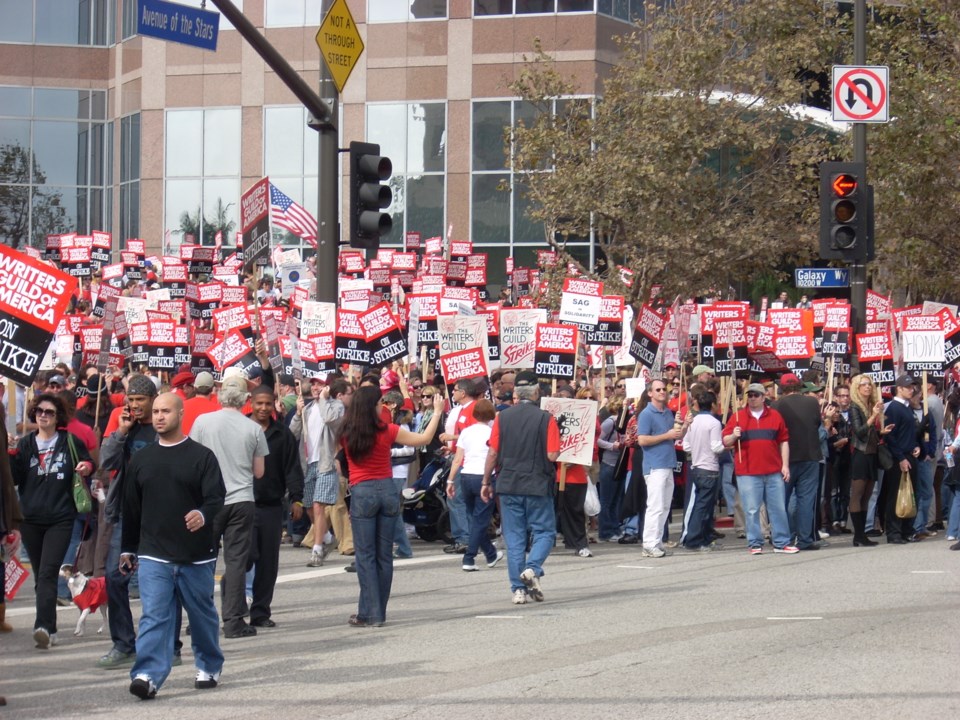According to the Vancouver Economic Commission (VEC), Hollywood North is the third-largest film and TV production centre.
Despite the pandemic shutting down filming for much of 2020, a record $4.8 billion was spent on film, TV, visual effects, and animation in B.C. the following year.
So, when it was announced Tuesday morning (May 2) that the Writers Guild of America (WGA) and the Alliance of Motion Picture and Television Producers (AMPTP) had failed to negotiate a deal many locals in the business paused to think about how a strike would affect production north of the border.
The WGA is now on strike for the first time since 2007.
Back then productions were shut down for 100 days and while economists couldn’t agree on how much the previous strike cost the Los Angeles economy or American entertainment industry, the figures ranged from $380 million to $1.5 billion.
Strike not a surprise to B.C. studios
However, the issues on the table now are very different than they were 16 years ago, according to Amy Lang, President of North Shore and Mammoth Studios.
The business model has changed, says Lang, from a linear cable network platform to a streaming platform. Production cost, pressures, inflation, and interest rates, all come into play during negotiations in a way they didn't in 2007.
Just because it's been a long time since the last one doesn't necessarily mean it's not going to happen again on a different platform of issues because the landscape has changed, she tells V.I.A. over the phone.
The strike will affect B.C., but Lang clarifies it is a global issue in terms of how this affects production.
“The implications across the board for B.C. are various, depending on where the productions are at in their production cycle, and possibly who's writing them,” Lang explains.
“We have two productions in prep right now,” she says. “There was some foresight that this was coming down the pipeline and so they adjusted their start dates and their shoot dates to hopefully accommodate for a potential strike, hopefully [one that is] not as long as the last strike was.”
Lang won’t name the productions but says that she doesn’t feel as if the B.C. film and television industry is bracing itself just yet, instead, it's “being mindful of planning and watching” how events unfold in the next few weeks.
“Certainly, you know, it's disappointing that they didn't come to a resolution prior to striking. But given the complexity of the issues at hand, I think in general, we were expecting it to go to this,” she says. “Not super surprised, but unfortunate.”
What does this mean for Vancouver productions?
Vancouver, and by extension, B.C. isn’t going to feel the immediate effects of the strike because of the nature of work done here.
Productions can continue to film what's currently been written according to Lang. Day-to-day TV shows such as late-night sitcoms and talk shows which don't typically appear in the B.C. market will be the first to shut down because they have writers working on them daily.
“For the B.C. market, where we're film and television, we have productions that are already pressing seasons that have written shows so they can continue to film, [and] they can also continue to film without doing any daily rewrites,” she explains. “There are ways around it if they have scripts.”
Domestic productions in B.C. also have Canadian writers and won’t be impacted, because not every piece of content that's produced in B.C. hinges on American writers.
How will the strike affect Canadian screenwriters?
The Writer’s Guild of Canada (WGC) sent a message to its members today in response to the WGA strike.
The WGC outlined rules and obligations for its members and offered support to the WGA.
“As a fellow guild and member of the International Affiliation of Writers Guilds, the Writers Guild of Canada (WGC) will support the WGA during its strike to the fullest extent possible,” read the statement secured by V.I.A. “The compensation issues raised by WGA writers are the same concerns affecting writers around the world.”
Dual members of the WGC and the WGA that reside in the U.S., have been told that WGA strike rules apply but WGC members that live in Canada may continue to work until December 31, 2023.
They may not, however, accept “struck work,” meaning, anything that is normally a WGA show, including U.S.-based productions and productions that are already under WGA contracts.
“The WGC, along with writers' guilds around the world, stands in solidarity with the WGA in their strike action for fair compensation for writers. We hope for a swift and fair resolution,” says Executive Director Victoria Shen.
President Alex Levine also feels that “the compensation issues that pushed WGA members to strike apply to all writers in the digital streaming age.”
“WGC members support WGA writers in their fight for fairness, and we applaud their strength and collective resolve,” he says.
Ready to get back to work when the time comes
If the strike continues for as long as the previous one there will certainly be financial implications for Vancouver, B.C., and the industry at large but Lang is confident that it will recover quickly, citing all the employment at stake, she says that everybody who works on production is sitting, waiting, and ready to go back to work as soon as possible.
“I think what's noteworthy is that, for the industry, this is business as usual,” she says. “We have been through this before." Though, “the back half of this year could be incredibly busy, to account for this holding pattern."
With files from Glen Korstrom.






